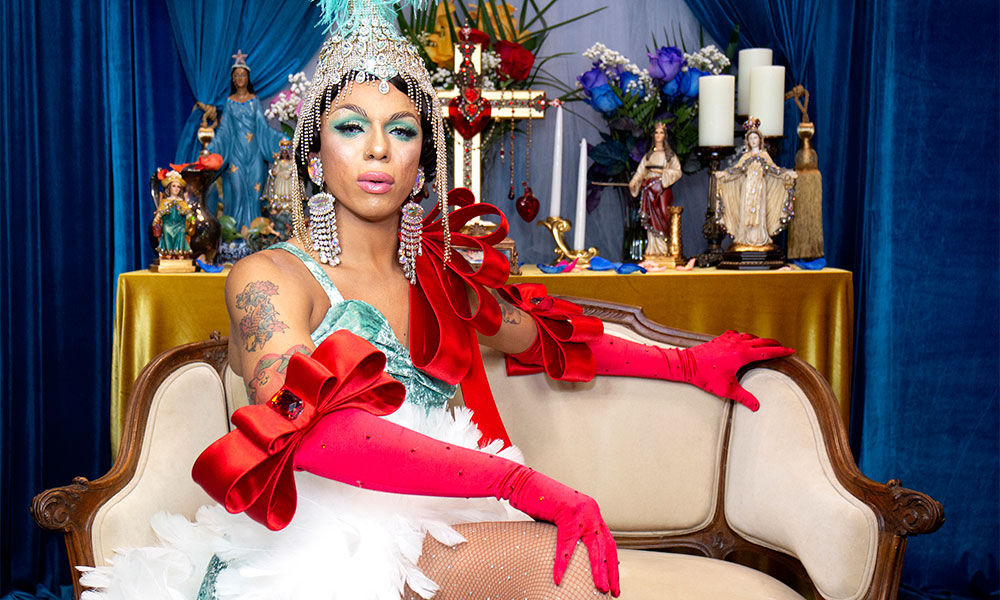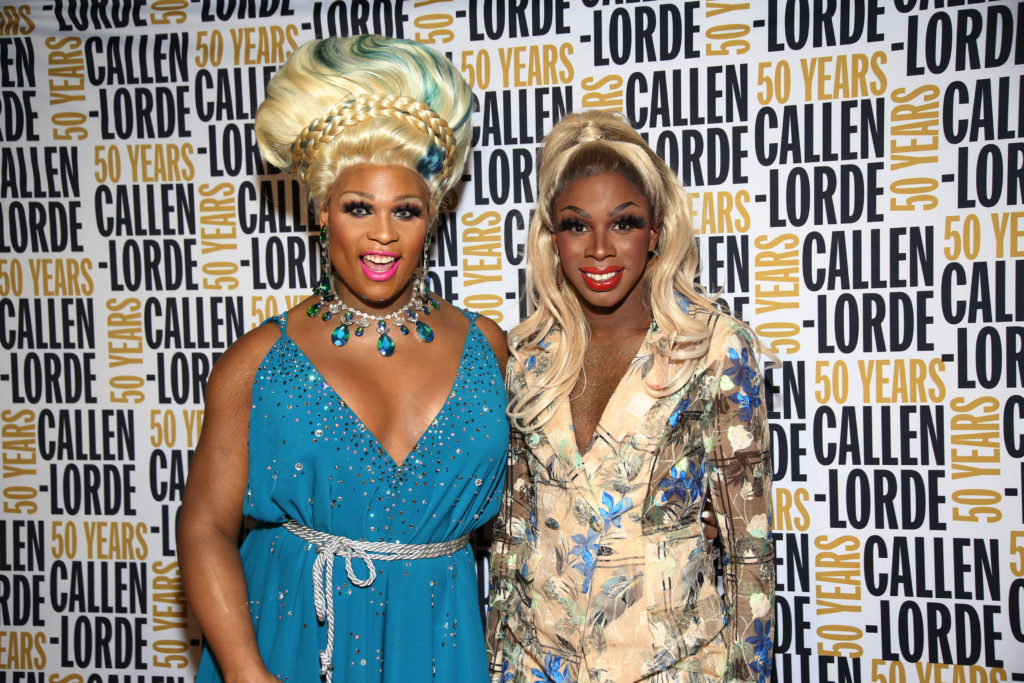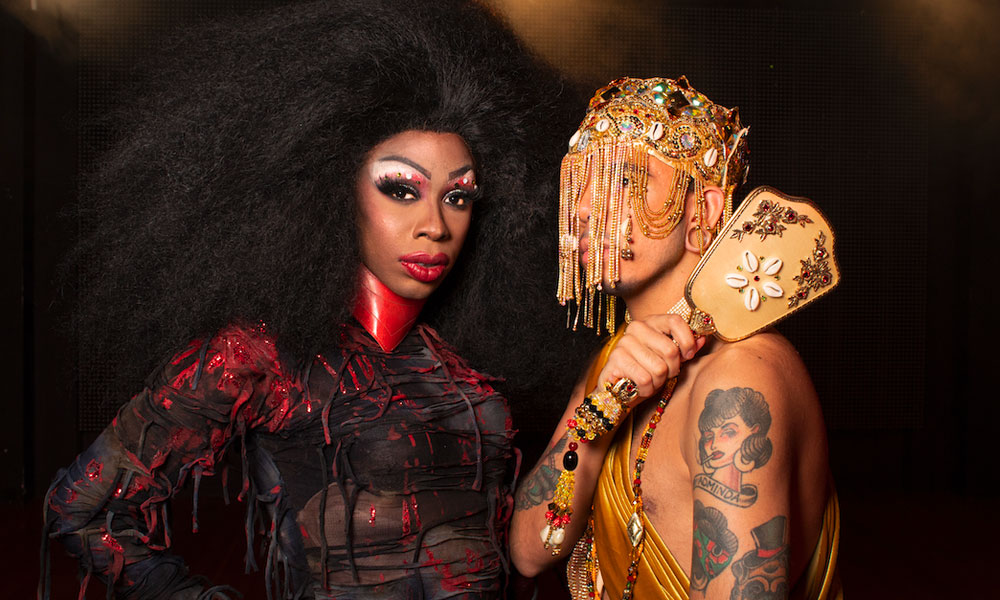Honey Davenport and Aja collaborated on Draw The Blood. (JJ Images)
Drag Race stars Aja and Honey Davenport spoke to PinkNews about their new single, the challenges that come with being a queer performer of colour, and Drag Race’s big diversity issue.
It’s well-established that the Drag Race fandom has a race problem. Since RuPaul catapulted the art form out of the club scene and into the living rooms of millions across the globe, there has been a clear, evidenced trend of white queens being rewarded by fans far more than those who are of colour.
There are those who point the finger squarely at the fandom. Others say RuPaul and his producers should be doing more to intervene.
But for Honey Davenport and Aja, there is a specific group of people whose words carry more weight than any others: their sisters in drag.
That’s the message of their recent joint single, “Draw The Blood”.
Inspired by the Martin Luther King Jr quote: “In the end we will remember not the words of our enemies, but the silence of our friends,” the song and its video (which Honey directed) send a powerful message to queens not of the POC experience about showing up and speaking out for those with less privilege.
PinkNews caught up with Aja and Honey to chat about race, social justice, and that other big topic, trans inclusion in drag.
PinkNews: How did the single come about?
Honey Davenport: The song is a social justice piece. Our experience of life after Drag Race has been different to our sisters who aren’t people of colour, and we wanted to share that.
Aja: It’s not like in regular life where you have a job and there’s one person throwing this type of unneeded energy at you, we have that coming from groups of people who bond over their hate for you. You have people sending you inappropriate things, calling you racial slurs, and it’s weird because it becomes normalised.
But the thing that sucks sometimes is that people who don’t have the experience of a person of colour – especially the Black experience – not only do they not realise this is happening, but a lot of times when they do they really don’t say anything either. It’s not like they’re doing it on purpose, but it tends to create this bystander narrative where people are unintentionally turning a blind eye.
Honey: That’s what the video really explored. Not only does it hurt to experience these things as a person of colour, but to watch your brothers and sisters see them happen and say nothing… Aja I were talking outside of a bar in New York the day the video came out, and she said the silence is deafening. The fact that people aren’t even willing to address that this is an issue is what hurts even more than the fact that it exists.
It’s a problem throughout the entire world and not only are you ignored as a person of colour within your queer community, but you’re also ignored within the POC community who doesn’t really care for the fact that you’re queer. So you’re literally being ignored by everyone.

Aja: Put it this way. The poster child of the gay community – not the queer community because that is very different – it’s always a specific type of gay and most likely, it’s the gay white boy next door. So what happens is, a lot of these people who go on to Drag Race or any other reality TV show are gay white men who fit into that trope, whether they identify like that or not.
That visual is comforting to these American families who are now the demographic of people who watch RuPaul’s Drag Race. Let’s be real, Sally in Kansas City is not relating to either Honey or I. She’s not looking at us and saying: ‘Oh my god, I want to look like that.’
I’ve worked at bars doing viewing parties, Honey has as well, and we all see how people are always really quick to hate on the Black queen, sometimes for no reason. And you know, White Queen can walk out there, and when I tell you, do nothing.
She appears like a f**king wild Pokemon on the screen and people go crazy.
Honey: That’s why it’s so important for people like Aja and I to keep creating, and keep telling our stories, to keep giving audiences other opportunities to experience. It does suck that we have to try 20 times harder. There’s a lyric in the song which is: ‘I don’t want to waste my life chasing after what’s not mine.’ That is to to say, if we haven’t been represented in the media mainstream in the way that our queer white brothers and sisters have been, it kind of feels like you’re wasting your life chasing a dream that’s not available to you simply because of the colour of your skin.
But you know, the more we continue to share our message and our experiences, the more we continue to start conversations about how we could change things. That’s that’s what we hope to accomplish.
Aja: The other thing is that there’s not really a big queer partaking in the upbringing of people of colour these days so you don’t really have as many younger Black kids and children of colour watching Drag Race as you do white kids. I cannot imagine when I was growing up my mother or father exposing me to Drag Race. Not because it’s a bad thing but because there’s this fear of dismantling masculinity, and in the Black community and and in urban communities there’s this sort of idealism that you have to like take care of your family and all the stuff that comes with that. There’s so much gender normality enforced from that.
Do you think that the way Drag Race has acquired this sort of audience is the reason why it’s been so slow to include trans queens?
Honey: You know, I loved it when Gia Gunn walked into All Stars, I think we all want to celebrate that kind of diversity. But I also want to point out that Drag Race isn’t the only platform for queer people, and it’s not solely RuPaul’s responsibility to celebrate them.
There is a lack of representation of trans people, and it is all of our responsibility to deal with that. I don’t think that it’s wise for us to point the finger. It’s Drag Race’s opportunity to accept trans people, but it’s all of our social obligation to create this platforms.
Aja: I understand that, but at some point I do think that RuPaul, as the as one of the biggest representations of drag in the world… you know what, f**k that. I can’t sit there and say it’s not their responsibility because it kind of is. You expose this beautiful art form to the world, to the mainstream – at least say where it comes from. At least say who helped create this.
We know what the T is. We know that Drag Race is a reality show, but people out there who don’t really understand reality TV, they think this is a real drag competition. Those people have a right to know that drag is not a man in a wig, drag is way more than that. And not allowing trans people onto RuPaul’s Drag Race not only makes it seem like drag is only about going from man to woman, it also invalidates the identities of other people who have been on Drag Race who are not of the cisgender experience.

Honey: Let me tell you, I was raised by Deja Davenport who is a beautiful trans woman, and I traveled the world with Peppermint as a backup dancer before I was a queen. Trans people have influenced my drag in such a way… I wish that they would always be celebrated on the level that I was celebrated with Drag Race. I’m not saying that they deserve something separate or they shouldn’t be able to be a part of Drag Race, but the fact that that it doesn’t exist is what we should be talking about. Drag Race doesn’t have to be the only opportunity.
Aja: It doesn’t, but it’s the biggest opportunity and to me that’s the issue. If it weren’t for trans performers none of us would be here. Not RuPaul, not anyone. It sucks because if we never did drag again and we all wanted to go get a job up the block, we can get a retail job anywhere and not be chastised for it. There are trans women who cannot even get a retail job right now. It’s just such a different playing field.
Why are we celebrating something that that was given to us by another group of people, and then denying them the highest platform of it at this moment in time?
Honey: I think that progress is not linear and as we take steps forward on some issues, we take steps backward on others. We have to keep taking in consideration other people’s experience and perspective, and that’s not something that we do a lot of in the queer community right now.
If we start to highlight people of colour and trans people the way we’ve highlighted what has become now the social norm of what a gay person looks like, if we make a point to do that as well then it will find its place in pop culture just like being a gay white guy has done.
Considering everything you’ve encountered post-Drag Race, would you change anything?
Aja: It’s crazy because I think these are the gambles people of colour take when they go on something like Drag Race. Going on it really skyrocketed my career, nut it also skyrocketed how much racism and how many really awkward racial situations I’ve had to deal with as well.
Everything from the policing of my race to the erasure of my race, to people picking and choosing what they think my race is just so they can judge me based on however they want to judge. Those type of more complex prejudices or something that people of colour have to really deal with after being exposed to such a large amount of people.
It also made me realise that as a person who is of the Black experience but has really light skin, I have a privilege, it is my responsibility to go forth and join my my deeper skinned sisters in their battle. At the end of the day of course we’re concerned with our own successes, but I think what really would be cool is if we use our success to help other people in our community and I think that’s what a lot of people really don’t do.
Honey: As a person who is darker skinned, I have experienced this even before Drag Race. And the most disheartening part of this experience of being a Ru girl is traveling around and seeing some of the local queens who are of colour and the way that they have to deal with injustices. But it has only pushed and inspired me to use this platform to speak up for those people. I consider happiness the freedom to exist and to create, and the fact that I have the ability to keep existing and keep creating it means I’m very happy.
